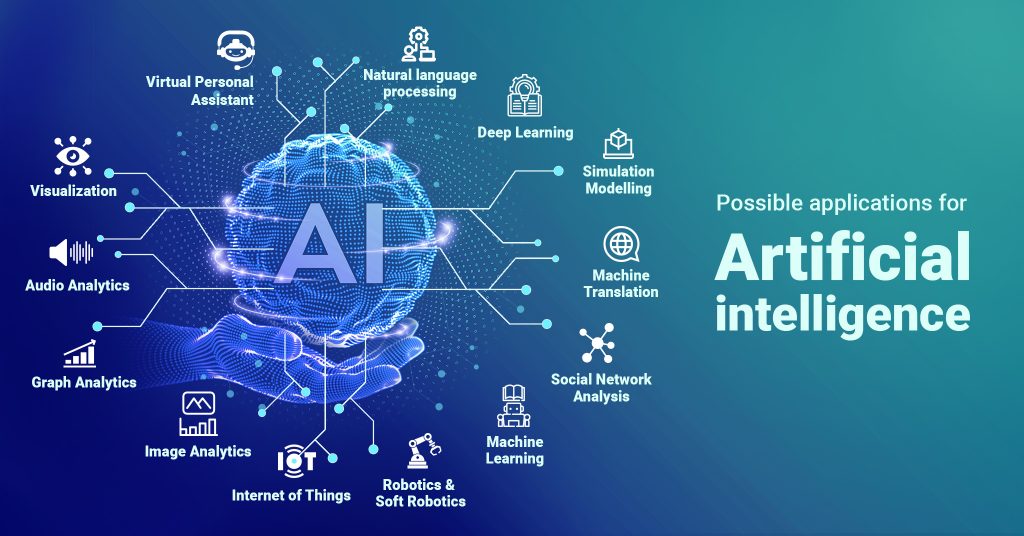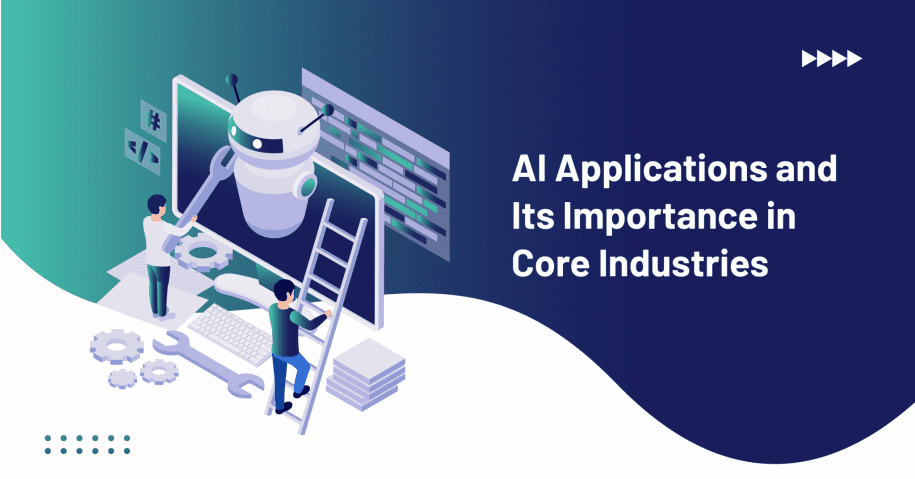Artificial Intelligence (AI) helps machines think, plan, draw conclusions, comprehend human requests, connect data points and promise real human-machine interaction. Industries and market leaders use AI to drive their businesses and achieve their goals. Today, you can combine different AI applications and technologies to make your machine smarter. Here, we will discuss the main AI applications and their usability in driving industry progress.
AI Applications in Depth
Machine learning and deep learning are two significant areas of Artificial Intelligence.

- Machine learning is all about using techniques of physics, OT, statistics, and neural networks and automating the construction of analytical models. The idea is to look for hidden information in your data without leaving room for guesswork.
- Neural networks are a form of machine learning, a computer system made up of interconnected units (such as neurons) that process information and extract meaning from unstructured and undefined data.
- Computer vision depends on deep learning to identify what’s in an image or video. If the machine can process images, it can interpret the environment.

Deep learning comes from the functioning of the human brain. It is a part of machine learning that can resolve complex issues, analyse structured and unstructured data, and provide prudent solutions. Some of the most important applications of deep learning are:
- Virtual assistants – a cloud-based application that understands natural language voice commands and performs user tasks. For example, Amazon Alexa, Siri, etc.
- Chatbots – an AI app for online chat with text or speech. It can communicate and act just like a human being and provides an automatic response to user input.
- Healthcare – Disease detection and computer-assisted diagnosis are possible using deep learning.
- Entertainment – YouTube and Netflix provide relevant recommendations for movies, music, and videos to improve the customer experience, thanks to deep learning. This is based on your browsing history, interests, and personal behaviour.
- News – News information can be aggregated and filtered based on social, geographical, and economic criteria and the preferences of individual readers.
- Other applications are image colouring, robotics, image captioning, advertising, etc., that proactively use machine learning and deep learning as basic AI applications.
Basic Concepts of Artificial Intelligence in the Identification of Sales and Marketing Prospects

Using AI applications in sales and marketing solutions can help you create extraordinary ideas that can open up new horizons for different industries and make your business more efficient, generating higher ROI. According to Accenture, AI can increase business productivity by 40%. Not only will this save you time and money, but it will also allow your business to deliver a high-quality customer experience.
This is how AI applications can help in sales and marketing processes:
- Implementation of market research using AI – Artificial Intelligence in conjunction with high-quality data can perform well in the real world. This allows them to target new audiences, identify leads and indulge in audience segmentation.
- Artificial Intelligence in predictive analytics for marketing and personalisation – AI can help sales and marketing teams to personalise their audience and customer experience. According to Salesforce, 76% of customers want a company to clearly understand their expectations. Let us take Amazon as an example – when you browse their site, Amazon’s AI knows what you’ve bought in the past, so it can make suggestions based on that activity. This can lead to highly personalised recommendations and potentially high conversion rates.
- Dynamic forecast of price and demand – Ultimately, inventory is overpowered by purchase constraints. AI enables demand forecasting and dynamic pricing, which help analyse historical data to predict future activities. Artificial Intelligence can analyse consumer interests, global events, and other sources to determine if demand for a particular product will increase.
- Artificial Intelligence in content creation – It can be difficult to deliver unique and engaging content. AI could provide intelligent automation suggestions to human writers for greater reliability and widespread access. Guided book suggestions underpin the functionality of apps like Grammarly, Microsoft Word, and SEMRush.
- Language optimisation for email marketing – One way AI creates content is its role in email marketing campaigns.
AI Applications in Inventory Management
Artificial Intelligence (AI) is in high demand in almost every industry, especially warehouse management systems. It provides powerful insights to help organisations better manage daily inventory management tasks.

Some of the few benefits of implementing AI technology are improving decision-making, reducing costs, eliminating risk, improving warehouse operations, and increasing productivity. According to statistics, by 2020, approximately 45.1% of companies have already invested in warehouse intelligent automation and 40.1% in AI solutions.
Ways to Manage Your Inventory Using Artificial Intelligence
When the technology is used in supply chain management and logistics, AI is estimated to add $ 1.3 trillion to the global economy over the next 20 years. Here are some ways AI can revolutionise warehouse management:
- Data mining and turning it into a solution – AI solutions can collect data, analyse it, and take timely action. By applying AI to your warehouse management system, your company can develop faster and find more effective solutions for specific situations. By monitoring, collecting, recording, and processing each customer’s data and interests, companies can understand customer needs, develop more effective strategies, and proactively plan their customer and inventory product needs.
- Address forecasting, planning, and management issues in the inventory management process. By implementing AI solutions, the power of technology can reduce the risk of oversupply and undersupply.
- Inventory and delivery management – Improper planning and inventory management can lead to problems impacting your revenue. AI technology is very useful in this regard. Technology can analyse customer data to identify behaviour patterns and other important factors.
- Robots equipped with AI to improve warehouse operations – The robotic intelligent automation market is projected to be worth more than $10 billion by 2023. Many benefits make AI-based robots better than human workers.
- Improved logistics
- Route optimisation reduces traffic loss and delivery times and thus saves costs.
- To calculate accurate delivery times using complex algorithms
Conclusion
Artificial Intelligence has revolutionised several industries, out of which sales, marketing, and inventory handling are just a few of them. AI solutions are implemented to improve user experience, enhance turnover, increase consumer satisfaction, and reduce costs. AI applications help improve organisations’ overall productivity across industries like e-commerce, healthcare, advertising, manufacturing, entertainment, and many other industries.


Leave a Reply